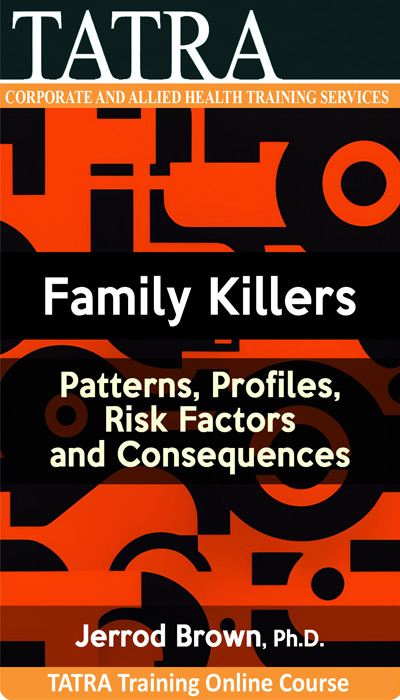08 Jun Family Killers: Patterns, Profiles, Risk Factors, and Consequences

Family or domestic homicide is an extreme form of domestic violence where a household member or significant other is murdered. Familial homicides can take several different forms including the murder of newborns, infants, siblings, children, parents, significant others, or other family members. Motivations for acts of family violence vary by the nature of the relationship between the perpetrator and victim (e.g., spouse-spouse, parent-child, or child-parent). Survivors impacted by the event are left to suffer grave consequences including serious trauma and the loss of a loved one.
This half-day training course is designed to introduce attendees to the different manifestations of family homicide as well as its causes, consequences, and risk factors. Intervention, screening, and prevention strategies will also be discussed. Other topics discussed in this training will include adverse life experiences, psychiatric comorbidity, substance misuse, rumination, possessiveness, estrangement, abrupt life changes (e.g., job loss), self-regulation deficits, executive dysfunction, self-destructive behaviors, and humiliation to name a few. Relevant research findings and case studies will be presented throughout the workshop.


This training will provide participants clinical knowledge and tools to:
a). Define family homicide and related typologies.
b). Discuss family homicide risk factors and warning signs associated with these complex cases.
c). Acquire knowledge about victim-offender relationships and profiles as they pertain to incidents of family homicide.
d). State potential motivations and neurobiopsychosocial factors for family homicide including family dynamics, psychological factors, traumatic life circumstances, and substance use.
e). Identify clinical, forensic, and legal intervention opportunities, techniques, and strategies aimed at preventing family homicide.
f). Learn and understand screening practices for domestic violence and family homicide.
g). Learn and understand foundational and up-to-date research findings and statistics on family homicide.
Target Audience:
Mental health counselors, psychologists, social workers, drug and alcohol counselors, marriage and family therapists, telehealth treatment professionals, and other clinical mental health professionals.


This online workshop will give you instant access to 3 sessions of video content, accessible via streaming on our website, as well as downloadable PowerPoint slides. You can view the course content in your own time, there is no time limit on access.
The duration of this workshop is 3 learning hours.
Please click the green ‘Mark Complete’ button on each module as you progress. A certificate of completion will be generated upon finishing the course and completing a short assessment quiz. If the certificate is not showing, please confirm you have marked all sections as ‘Complete’. Please consult your professional organisation/association to confirm whether you are able to claim any CPD points/hours for this online workshop.



 Jerrod Brown, PhD, MA, MS, MS, MS
Jerrod Brown, PhD, MA, MS, MS, MS